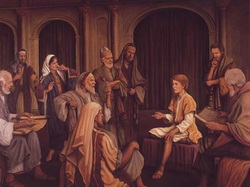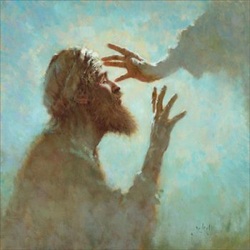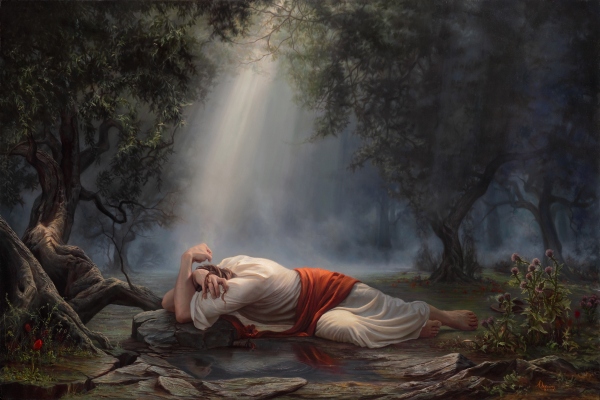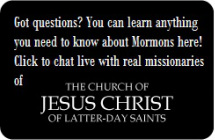 When Jesus Christ had grown to twelve years of age, He lived in Nazareth with His mother Mary and step-father Joseph. He was filled with the Spirit of God and had wisdom far beyond His years. Every year, Joseph and Mary had the tradition of going to Jerusalem for the feast of the Passover. Young Jesus accompanied His parents to the Passover feast. When all was said and done, Joseph and Mary packed up and made the return journey to Jerusalem, unaware that Jesus was not with them. Too understand how they could have forgotten their only child, a child who would be Savior of the world one day for that matter, it must be understood that the family was traveling in a large caravan. Joseph and Mary's extended families were all making this trek together. It would make sense for them to think that Jesus was simply with some of the other children in the caravan. After traveling for a whole day, Joseph and Mary, searching throughout the caravan, noticed that Jesus was not among them. Panicked, they returned to Jerusalem to search for their son. After what must have been a torturous three days of searching, Mary and Joseph finally happened upon the twelve-year-old Christ. They found him in the temple, conversing with some well-versed priests. The men were exceedingly amazed at this young boy and His extraordinary knowledge of the things of God. Tremendously relieved to find her son, Mary came to Jesus and did what any concerned mother might do, and scolded Him for wandering off on His own. "Son, why hast thou thus dealt with us? Behold, thy father and I have sought thee sorrowing." Today, she might have said, "Son, how can you do this to us!? Your father and I have been worried sick!" Being very wise for His age, Jesus simply answered, " How is it that ye sought me? Wist ye not that I must be about my Father's business?" The reunited family then happily returned home. This account, from Luke chapter two is the first time we are told of Christ taking upon Himself the magnitude of His calling in life. It can be reasoned that this early act of wisdom was when He truly understood the meaning of His station. Being "about His Father's business," had him in the temple, studying, worshiping, and strengthening other children of the Lord. It is incredible to think that at such a young age, He knew is purpose. He knew the tremendous things that God had in store for Him. He had the conviction and discipline to work and speak by the Holy Spirit in all things. An excellent example for us all if their ever was one. I conclude in His name, Jesus Christ-- Amen.
 Those of us who can see generally take this ability for granted. We hear this a lot: that we, as people, expect some mundanely normal experience to be a given. But it's all too true. You don't know what you have until you no longer have it. The visually impaired know all too well that sight is a blessing of the greatest kind. This was no less true than in the time of Jesus Christ. Sometime before Jesus rode triumphantly into Jerusalem, the Savior was traveling through the city of Jericho. As He came into the city, the people of Jericho were understandably stirred up by His presence. A stone's throw away, a blind man sat by himself, wondering what all the clamor was about. This man, unable to see, was probably unable to work. Though being blind is still no picnic, obviously it wan't like today, when the blind are blessed with many advanced tools allowing them to function in the everyday world. Nor did the blind (or those with any handicaps for that matter) have laws in place to protect them from unemployment and poverty. In many circumstances, a handicap could be a social death-sentence. The blind, dumb, deaf, and lame could only sit on the periphery, dependent on the kindness of others. When this particular man asked a passerby, He learned, to his delight, that the crowd was stirred up because Jesus of Nazareth was passing through. This was his chance. The man yelled out to his Savior, pleading, "Jesus, thou Son of David, have mercy on me!" The people, shocked by how loud and audacious this man was being, scolded him. They told him to hold his peace. It was not dignified to be so bold. But he did not care. It didn't matter what these people thought. Jesus had come to bless him, to lift him out of his humble circumstances. He yelled again, "Thou son of David, have mercy on me!" The Lord commanded that this man be brought to Him. With the man before Him, He asked, " What wilt thou that I shall do unto thee?"The man knew what he required. Trusting in his God, he said, "Lord, that I might receive my sight." Pleased with this humble man, Jesus said, " Receive thy sight: thy faith hath saved thee."In an instant, his vision was restored. Before him stood his Savior, the Lord Jesus Christ. Oh, the sweetness of that first of many wondrous sights this man would see. He got up, and followed his Savior, and the multitude glorified God. Even if our physical eyes are in perfect health, we all may lose our sight. Being blinded by our carnal desires and worldly temptations, we may at times find ourselves lost in the darkness, with seemingly no way of getting back. I testify though, that if we but have faith, and turn unto Him who can restore our vision, that we can know the way to true happiness. The Lord and Savior Jesus Christ is that way, and through Him and Him alone can we be made whole. His eternal power will open our eyes if we but ask. We need not be ashamed that we come to Him, for why would the opinions of other's matter when our eternal happiness can be secured through Him we approach? I leave you with this message in the His holy name, Jesus Christ-- Amen
We all make sacrifices. Every one of us has at one time or another given up something for a greater purpose. We all know how this feels. But one thing that none can begin to comprehend is the magnitude of the sacrifice our Lord and Savior Jesus Christ made on our behalf. A mortal being cannot feel the same degree of love, or experience the same level of devotion that our elder brother had for us. But through the guiding influence of the Holy Ghost, one can come to appreciate and relish the gift that our Lord has given us in the atonement, and we can learn to accept this gift in our lives and apply it where we are in need. The atonement of our Savior was an all-encompassing sacrifice. Prior to the time of Jesus, believers followed what is known as the Law of Moses, the code of righteousness given by God in that era. With the coming of Jesus Christ, however, the Law of Moses was replaced with a higher law. The night before his crucifixion, Jesus and his twelve apostles convened in the top floor a house, and had what we refer to as the Last Supper. Jesus broke and blessed bread for the apostles and explained that it was a representation of his body. He blessed and passed around wine, explaining that it was a representation of the blood he would shed for them. These actions would in time become known as the Sacrament. After the Last Supper, Jesus and his disciples walked into the garden of Gethsemane. The Savior told his disciples to stay back and kneel, to pray that they enter not into temptation. He continued to walk several yards further, until he was alone. It was then that Jesus Christ prayed to his eternal father, and begged, s aying, "Father, if thou be willing, remove this cup from me: nevertheless not my will, but thine, be done."Our Redeemer suffered there in the Garden of Gethsemane. He felt every pain, experienced every ailment, and endured all sorrow that man had ever, and will ever feel, all at once. He writhed in pain, and in his agony, he bled from every pore of his body.He was then betrayed by his apostle, Judas, who sold him to the angry Pharisees, who beat him, mocked him, unjustly tried him, and crucified him, one of the most painful forms of murder that man has ever devised. He gave up the ghost, and ascended unto his father, returning three days later as a perfect, resurrected being.This pain was not needless. Our Lord Jesus Christ suffered these agonies to understand us, to descend below the deepest depth that man could sink to, to empathize with all pain and sorrow that man could feel. His agony atoned for our pains and ailments, but more importantly, it atoned for our sins. Thanks to the Lord's sacrifice, we can activate the atonement when we sin, we can repent, and turn away from our sins by partaking of the sacrament and washing away our sins with the help of our Savior and Redeemer.We must always remember the love and devotion that Jesus Christ feels for us. He, as our elder brother, wants nothing less than for us to succeed. The life he freely gave and the crushing burden he freely bore are indeed a testament to his loving care, and he loves us all unconditionally. I leave you with my testimony, that our Savior Jesus Christ is the literal son of God, that he atoned for our sins so that we could come closer to our father. I testify of our Savior's love, of my love for him, and of the perfect example of righteousness he is in my life. I close this article in his holy name, Jesus Christ--Amen
|




 RSS Feed
RSS Feed